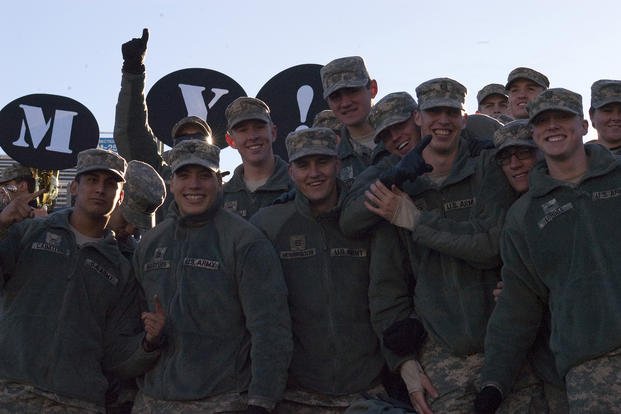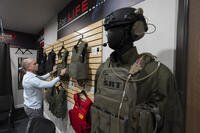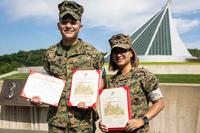The first question that a candidate should be prepared to answer is, "Why do you want to go to West Point?" Whatever the reason, they ultimately will lead American soldiers, possibly in combat against terrorists.
The basic standards for consideration have changed somewhat over the years. On July 1 of the year of admission, a candidate must be at least 17 years of age but not yet 23; a U.S. citizen (except for international cadets); and unmarried. Also, candidates must not be pregnant or legally obligated to support a dependent.
Academically, candidates must have an above-average high school/college record and score well on the ACT or SAT. Recommended high school/college courses include four years of English, four years of mathematics (pre-calculus and calculus, if available), two years of a foreign language, two years of laboratory science and one year of U.S. history; plus geography, government, economics and computing.
Physically, candidates should participate in vigorous competitive team sports, individual sports that stress endurance (including running at least two miles), and personal training that includes push-ups, pull-ups and sit-ups.
From a leadership standpoint, participation in sports, student government, public speaking and activities such as Boy Scouts and Girl Scouts continue to be important, with the caveat that the academy would prefer distinction in a single activity over mere participation in a variety of activities.
Medically, a candidate must be in sound mental and physical health. A modern requirement: no tattoos or brands on the face, neck or head. No tattoos prejudicial to good order and discipline anywhere. On R-Day, all existing tattoos, brands and body modifications will be documented. Additions to the same while a cadet is grounds for dismissal.
The physical fitness evaluation is tougher than it was years ago.
For one thing, it is carefully timed, with limited rest (only three minutes) between the first five events, and a rigid sequence of events. The first event is a kneeling basketball throw (three attempts in two minutes). A max score of 100 points requires men to throw the ball 102 feet while women can max it with a throw of 66 feet. After a short rest, candidates have two minutes to do pull-ups (palms forward) from a dead hang. Max is 18 for men and seven for women. Another short rest (three minutes) is followed by a shuttle run -- out 30 feet, turn, race back and repeat. Two attempts are allowed in two minutes. Top score is 7.8 seconds for men and 8.6 seconds for women. Next come sit-ups: both men and women need 95 in two minutes to max. After another short rest, push-ups loom: men need 75 in two minutes; women need 50 to max. Finally, after an eight-minute rest, all candidates run the mile. Men can gain 100 points for a 5:20 effort; women have to make six minutes flat. As all candidates are in competition with at least some other candidates, minimums tend to be less important.
Some things, however, do not change. Every candidate must secure a nomination from a congressman, senator or the vice president, or if eligible, secure a service-connected nomination.
Each congressional nominating source has a total of five vacancies at West Point -- ideally, at any given time, at least three or four are filled with current cadets. For any remaining vacancies, 10 young men or women may be nominated to compete. Fully qualified candidates not receiving an appointment are placed on a national waiting list for vacancies that may arise. Often, several hundred new cadets are selected from this list, some just a few days before R-Day.
The admissions website offers guidance on applying for nominations and a lot more. Interested students can start young and sign up for a mailing list to receive age-appropriate literature from the academy. Older candidates (second semester of junior year in high school or older) may open a file at West Point online after reading a general prospectus.
The academic workshops of yore now are called Summer LEADERS Seminars. (LEADERS is an acronym for aspects of the West Point experience: Loyalty, Ethics, Academics, Duty, Excellence, Respect and Sports.) This year, about 735 high school juniors attended one of two sessions conducted during June. They lived in the cadet barracks and ate in Washington Hall. In addition to participating in academic workshops in four of 16 courses offered, the attendees receive daily physical fitness training, compete in intramural athletics, spend a day at Camp Buckner on the Leaders Reaction Course and receive other military orientation. They also tour West Point and the Museum, take a boat ride on the Hudson, and even enjoy a mixer. All candidates are led and trained by a cadre of about 43 cadets. Students may request applications for the Summer LEADERS Seminar online from September to April of their junior year in high school by visiting the admissions website and selecting the Summer Seminar tab.
Interested students also may make an orientation visit to the academy. A cadet volunteer will escort the student to an academic class and to lunch in Washington Hall. These visits typically begin at 9 a.m. on Mondays through Fridays from September through April. At least two weeks' advance notice is required to schedule such a visit.
If you would like to help qualified young men and women seek a nomination, you may be interested in becoming an admissions volunteer. All it takes is dedication, some free time and the willingness to learn about the various aspects of the process.
Want to Know More About the Army?
Be sure to get the latest news about the Army, as well as critical info about how to join and all the benefits of service. Subscribe to Military.com and receive customized updates delivered straight to your inbox.















